 The logo of the article defines three, both temporal and geographical, points on my life path, through which my way to the country called "Programming" lay. In the city of Cheboksary, in the homeland of the legendary divisional commander of the Civil War VI Chapaev, I spent my childhood (1954-1968), where I finished 8 classes of secondary school №6. In 1968 I moved to the next geographical point, in Kazan, to the Kazan Suvorov Military School (KzSVU). After the end of the
KzSVUin 1971, my path lay in the capital of our Motherland in Moscow, in the Military Orders of Lenin, October Revolution and Suvorov Academy. F.E.Dzerzhinsky (abbreviated name of VA named after F.E. Dzerzhinsky or VAD), which in 2020 celebrated 200 years since its foundation. And on June 22, on a tragic day for our country in 1941 and a landmark for me in 1976, I graduated from the VA. F.E.Dzerzhinsky and received a diploma in the specialty "Programming" with the qualification of a military engineer programmer:
The logo of the article defines three, both temporal and geographical, points on my life path, through which my way to the country called "Programming" lay. In the city of Cheboksary, in the homeland of the legendary divisional commander of the Civil War VI Chapaev, I spent my childhood (1954-1968), where I finished 8 classes of secondary school №6. In 1968 I moved to the next geographical point, in Kazan, to the Kazan Suvorov Military School (KzSVU). After the end of the
KzSVUin 1971, my path lay in the capital of our Motherland in Moscow, in the Military Orders of Lenin, October Revolution and Suvorov Academy. F.E.Dzerzhinsky (abbreviated name of VA named after F.E. Dzerzhinsky or VAD), which in 2020 celebrated 200 years since its foundation. And on June 22, on a tragic day for our country in 1941 and a landmark for me in 1976, I graduated from the VA. F.E.Dzerzhinsky and received a diploma in the specialty "Programming" with the qualification of a military engineer programmer:
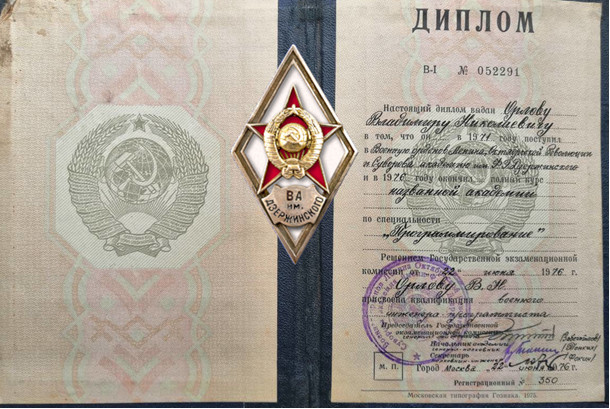
It happened 45 years ago. But I entered the programming path even earlier, namely, in 1971, when, after graduating from the KzSVU , I came to the capital of our Motherland to enter the VAD . And that was exactly fifty years ago. And that's exactly how I got on this path and how I walked and walk along it, and there will be my story. And it is dedicated to my parents Orlov Nikolai Yegorovich and Orlova (nee Kulygina) Zoya Fedorovna:

I. Father's house
My choice of the path of Programming, I think, was not accidental. It was conditioned by my entire happy childhood.
My childhood was spent in the small provincial town of Cheboksary, where the population was then less than 100,000 people. Our family was large. My father and mother had four brothers, from left to right, Gena, Yura, Vova, Seryozha:

And since I was the eldest, I had to deal with them a lot.
I thought and it turns out that my story is actually about how people lived in the Soviet Union. It must be said right away that our father, just like our mother, came from simple peasant families. Below is the house in which my father was born and grew up (he is in the center, and in front of him I and my brother Gena):

It was from this house that my grandfather Egor Mikhailovich Orlov went to war and died near Moscow:
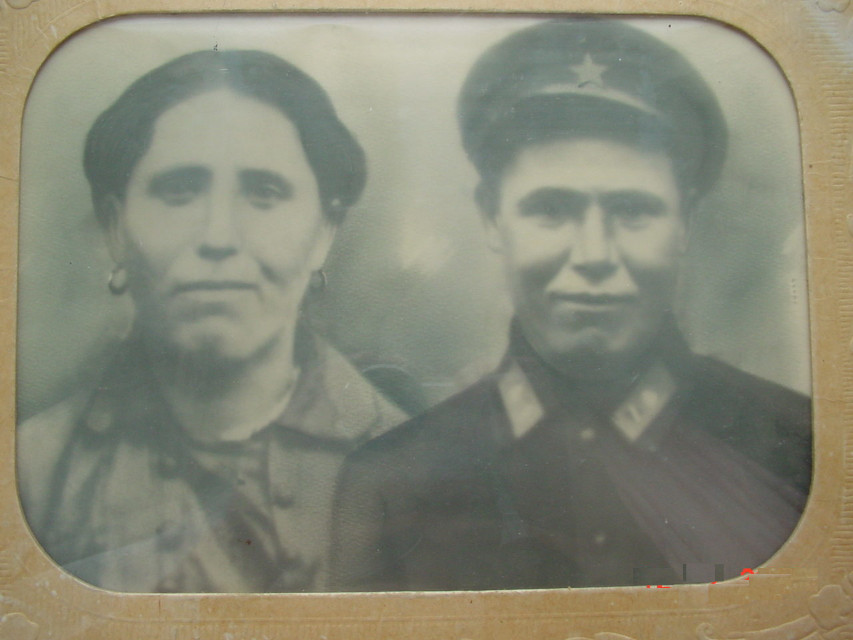
Mom grew up without a father, and when the war began, her three siblings, Boris, Vladimir, Alexander, and my uncles went to her and died there. And if not for these sacrifices, then it is not known how our life would have developed (if it still existed).
My parents in the Great Patriotic War, as they say now, fought on the labor front: my father worked on a collective farm, and by the will of fate, she was brought to Penza to a military plant, where she became a stakhanovka, which she was very proud of.
Our family moved to Cheboksary in 1954 from the Urals, where my mother and father worked in logging after the war and where I was born (in the photo I am in the center), and on the way to Cheboksary my brother Gena:
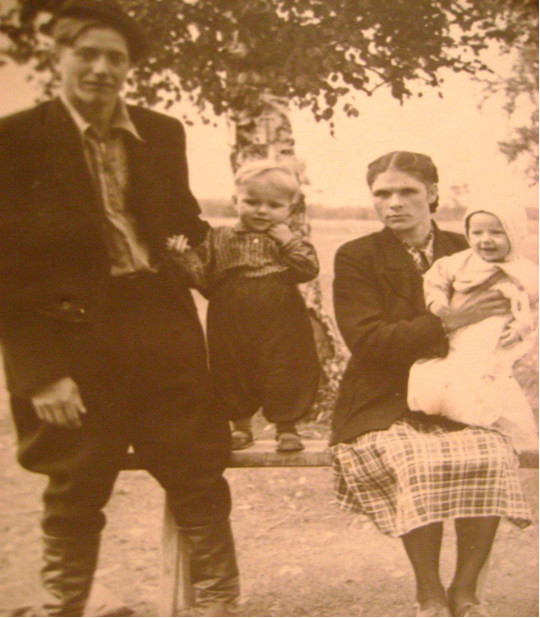
I remember myself from 3-4 years old. I remember especially well our trips to Moscow in 1957 and 1958. The most vivid memories are a visit to the Lenin-Stalin Mausoleum, when I had to stand in huge queues, starting in the Alexander Garden, and carts with hot sausages.
Our first dwelling in Cheboksary was a room in a barrack. She was given to her mother from the construction of the Cheboksary plant of tractor spare parts (today it is the Aggregate Plant), where she got a job as a thermist in a hot shop.
A barrack is usually a one-story building, usually wooden, with a full-length passageway and divided into rooms by partitions. The rooms were 12-16 square meters. The toilet was usually located in the yard, the heating was stove, and the kitchen was shared. Water - in the column outside. Unfortunately, I could not find a photo of our barrack, but I found a similar one:

After the Great Patriotic War, the size of the destruction on the territory of the USSR was colossal, more than 30 million people lost their homes, approximately every seventh in the country. Chernigov, Sevastopol, Velikiye Luki, Belgorod were completely destroyed. In Stalingrad, Minsk, Kursk, Novgorod and many other cities, more than 90% of buildings were destroyed. Millions of our citizens ended up in dugouts. The construction of barracks was a forced and temporary measure both to resettle the people who were left homeless and to provide housing for people arriving to build new factories. So it was in Cheboksary during the construction of the Cheboksary plant of tractor spare parts.
But if a photograph of our barrack has not survived, then a photograph of our room in this barrack (and more than one) has survived:

This is somewhere around 1956-57. See what happy faces people have. In the photo from left to right, my father, the author of this article peeking out of his chin, then my mother. The meeting took place on the occasion of the arrival of the father's brother with his wife from Saratov (the couple in the center) and the visit of the mother's sister and her husband. The latter lived in Cheboksary in their house on the street. Krasnoflotskaya. It is gone now, in its place is the Olympic Stadium.
As I said, the barracks were a temporary measure and already in 1957 we moved to more comfortable housing, to a communal apartment at 4 Shkolny Proezd:
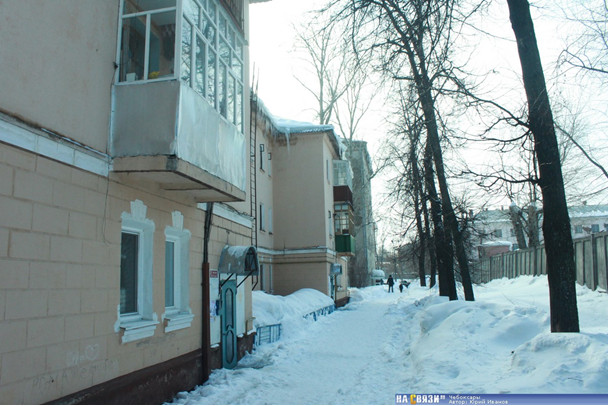
In the USSR, communal apartments, dormitories and temporary barracks were one of the main types of workers' housing until the beginning of the mass housing construction of individual apartments in the 1960s, before the construction of the famous Khrushchevs began.
Famous construction projects of the 70s, such as Nizhnekamsk and Cheboksary chemical plants, KAMAZ, Cheboksary hydroelectric power station, Cheboksary industrial tractor plant (CHZPT), have already been erected without barracks. Together with these industrial giants, the modern cities of Nizhnekamsk, Naberezhnye Chelny, Novocheboksarsk grew, and in Cheboksary the New District grew:

But back to the communal apartment. The communal apartment already had a toilet, bathroom, central heating. If my memory serves me, then in our apartment there were four rooms, in each of which a separate family lived.
 And since my parents worked, we were often left alone at home. The door to our room was naturally always open.
And since my parents worked, we were often left alone at home. The door to our room was naturally always open.
Once my brother and I were left alone and went with him to the common kitchen, where each family had their own table. They found a box of matches. Some of us said that they are not real and we decided to check it out. The result was disastrous, a tablecloth flared up on one of the tables. We ran from the kitchen to our room. Fortunately for us, in one of the rooms of the house there was someone's grandmother, who put out the beginning fire with a blanket. Since then, I have remembered for the rest of my life that fire can be extinguished by covering the source of fire, for example, with a blanket, and most importantly, games with fire can end sadly. That is why posters on the theme of matches and children were so popular at that time.
From here, in 1960, I went to the first grade at school number 28, which was located on the same street next to the house. The school building has survived, but the school is not there:
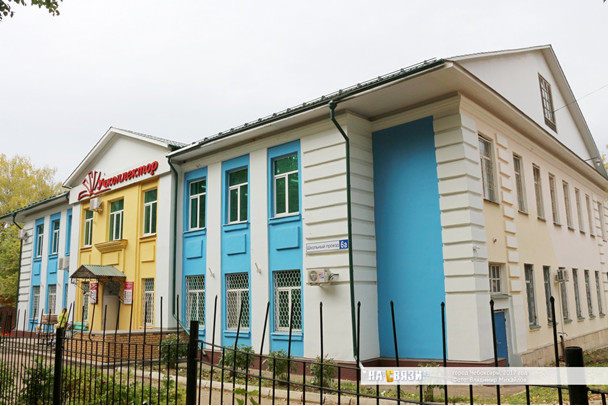
The first class was remembered for two significant events. First, this is a total solar eclipse, when we were taken out into the street and we first-graders watched how day turns into night. And in the spring of 1961, I fell under the ice into a foundation pit in the school yard. I must say that when I went to school, I could neither read nor write. But this shortcoming was soon eliminated and reading became my favorite pastime, especially with a flashlight under the covers. I must say that our whole family read a lot. We had a good library. For example, I was read by Karel Chapek ("The Makropulos Means", "The War with the Salamanders", etc.) and, oddly enough, by Yemelyan Yaroslavsky, his story about Ancient Egypt. That is why, probably, I developed a craving for history.
How did we live in a communal apartment? My answer is good. Look at these faces:

They are all happy. I am in the photo in the lower right corner, my brother Gena is one person to the left, and behind him in a white blouse is our mother. Look at these faces. Now you will not find such faces.
Moreover, none of them had refrigerators, but there were sheds (in the photo of the house, they would be instead of a fence). In these sheds, people kept firewood, someone kept chickens and turkeys, which were so common at that time, and someone also kept pigs. In these sheds, cellars were dug, in which ice was stored in the spring and which served as refrigerators:
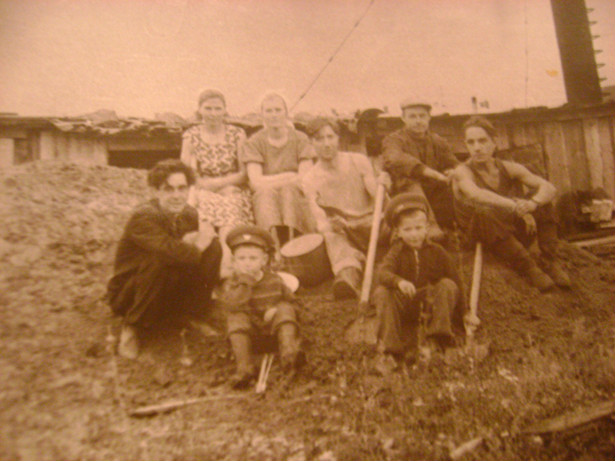
In the first row in this photo are two boys in school caps - me (on the right) and my brother Gena.
In the early 70s of the last century, I happened to visit our communal apartment. Only it was already a separate (I would say luxurious) four-room apartment, in which one family lived, our neighbors in a communal apartment. All other neighbors received separate apartments from the state free of charge and moved into them.
Came 1961, the year of the first manned flight into space. These people were a citizen of the Soviet Union Yuri Gagarin:

In the same year, our family of five people (in 1960 I had a second brother Sergei) moved to a separate apartment with all the amenities on the street. Yaroslavskaya (today Engels st., 12, in the photo the first house on the right):

Our apartment was on the sixth floor (there was no elevator) and how proud we were. In those years, few people lived so high in Cheboksary. But the most important thing was that the entire first floor was given over to the Station of Young Technicians (SYUT). I must say right away that today this station is not there, and all the premises are occupied by commercial enterprises. And then one fine day, already studying in the second grade, I opened the door, crossed the threshold of the SUTand ended up in a magical world. I was greeted warmly and escorted throughout the station. The guys (though they were older than me, I was in the second grade) assembled models of ships and airplanes, built gliders, printed photographs, and someone showed films. The eyes fled. As a result, I enrolled in almost all circles: photography, aircraft and ship modeling. Enrolled in projectionist courses. At the projectionist courses, we were taught to spin films on the "Ukraine" cinema projector.
Everything was absolutely free. How did I manage? I was lucky that the SUT was in the house where I lived, and school # 16 was nearby, a two-minute walk away.
I am still proud to say that in the second grade I received my first projectionist license. There was a case when there was no one in the club to show the film "Stepan Razin". And then my ID came in handy. It also came in handy in the future, when it was necessary to demonstrate educational material in the "Ukraine" at school (there were no VCRs and computers at that time).
And how people came running to watch when we launched gliders into the sky, and even more cord models!
SYUT was a good school, she gave me a lot. I stopped visiting the station of young technicians after we moved to a new place of residence.
And I was also lucky to meet in Cheboksary in 1962 Cosmonaut-3 A.G. Nikolaev:
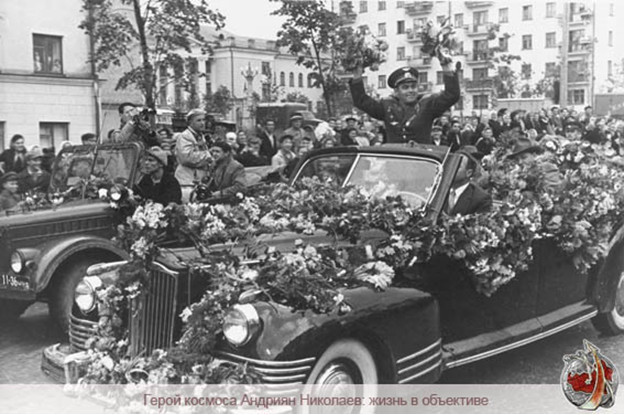
At that moment my father and I were on the roof of the house on the left. You should have seen what was happening in the city. I was lucky to meet in Cheboksary the first woman cosmonaut Valentina Tereshkova:
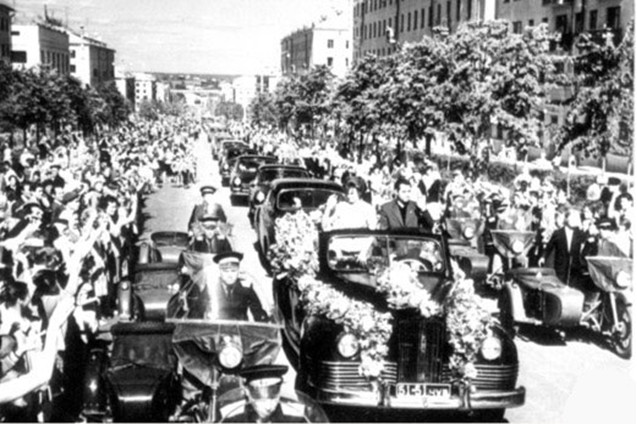
At the moment the cortege followed, I was in the first row near the children's world (in the photo there is the second house to the right of the upper left corner) and one of the motorcycles drove its wheel over my boot. These are the memories. Life was just seething.
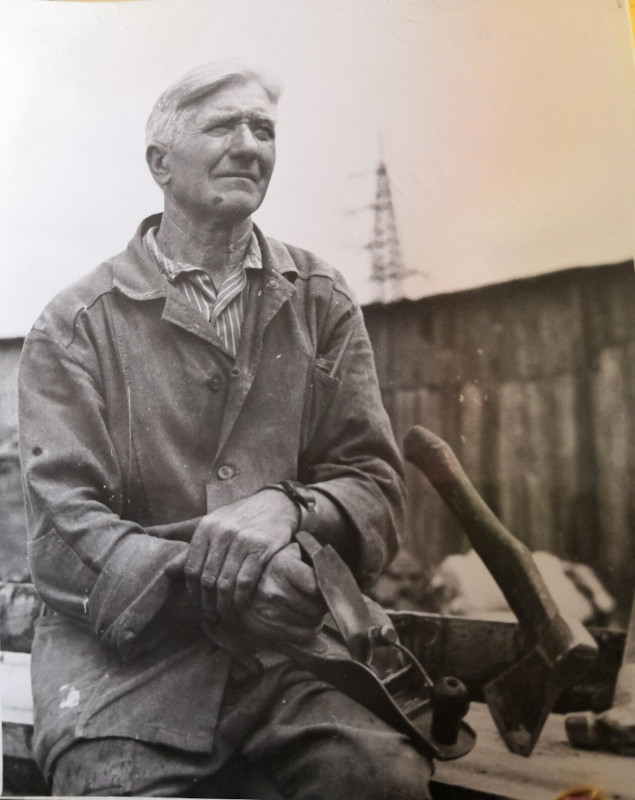 My father was proud all his life that he was also involved in the flight of A.G. Nikolaev into space. About a month before the flight, a team of carpenters, in which my father also worked, was sent on a business trip (they did not know such a word) to a remote Chuvash village.
My father was proud all his life that he was also involved in the flight of A.G. Nikolaev into space. About a month before the flight, a team of carpenters, in which my father also worked, was sent on a business trip (they did not know such a word) to a remote Chuvash village.
It turned out that it was urgent to build houses for a simple Chuvash old woman. No one understood anything, but the house was built, and soon the secret was revealed, it was the house for the mother of Cosmonaut-3.
In 1961, I had another brother, the third - Yura.
And in the spring of 1964, I made the first attempt to go to study at the Suvorov military school. As I said, I read a lot, including about the Suvorovites. In those days, military-patriotic education was at its best. I knew that the Suvorov military schools (SVU) are taken after the fourth grade. A boy studied with me in the class, whose father was a test pilot and died while testing an airplane. We were friends with him and wanted to go to the SVU together . But it was in 1964 that the decision was made to admit IED only after the eighth grade. Our childhood dream was postponed for four whole years.
In the same 1964, my parents received a three-room apartment on V. Chapaeva Street, 11. This street is famous for the fact that it stands on the site of the village of Budaiki, in which V.I. Chapaev, the famous divisional commander during the Civil War, was born. In the place where the house of the Chapaev family stood, today there is such a monument:

The inscription on the memorial plaque reads:
"Here stood the house in which V. Chapaev was born on February 9, 1887"
After the move, I had to change the school. Now I attended school # 6, which was also not far from my home. But, having stopped going to SYUT , I started attending a basketball section and a sambo section in the Dynamo sports complex at school. In the basketball field, my throw from the middle of the field and hitting the opponent's ring when we played for the city championship was engraved in my memory. It was something. And in sambo, the final match for the city championship was also engraved in my memory, when I could win a fight on the mat by performing a painful hold on the opponent's elbow (elbow lever). However, until the final bell, I could not break the opponent's hands locked into the lock.
It is worth mentioning separately about chess. My father's sister's husband, Nikolai, played chess very well:

They often came to our house, sometimes with an overnight stay. They were the ones who gave me chess and, most importantly, instilled in me love for them. Each of their visits to us began with a game of chess and not just a game, but a game with analysis. And then the moment came when Nikolai told me:
“That's it, I can't give you anything else here. You have surpassed your teacher "By the way, I called all the sisters of my father and younger brother by their first names. This was their wish. They always considered me an equal. It's great.
And at the beginning of 1968 in Budaiki, not far from our house, the Spartak Sports House was opened (you can see it in the photo below). And somehow, passing by him, I saw on the notice board that an entry was being made to participate in a qualifying chess tournament of the II category. The tournament was organized and conducted by the international chess master V.D. Sergievsky. The name of Sergievsky in those years thundered in Cheboksary and I followed his success. And he had successes. In 1966, he became the champion of Russia in chess, took the sixth place at the M.I. Chigorin memorial, having won the tournament against the future world champion B.V. Spassky. It was at the Chigorin memorial that Sergievsky fulfilled the standard of an international chess master.
When I saw the name Sergievsky, I had no doubts and I entered the Sports House to sign up for the tournament. I had a good tournament and took second place. The winner of the tournament, a young man 2-3 years older than me, was much stronger than me. But we must bear in mind that I was still self-taught. Under the terms of the tournament, the first place was given the II grade, and the second - the III grade. So, I became a third-rate chess player and, as it turns out a little later, it will have its consequences. There was a curious incident during the tournament. I played one of the games with a boy who was four years younger than me, but he studied with Sergievsky himself and showed great promise. Before meeting me, he won against everyone, but he lost to me. And then the unexpected happened, he burst into tears, no one could calm him down. As a result, Sergievsky himself approached me and asked me to replay the game.It was very unexpected for me: to replay the game in chess ... But Sergievsky found some words and I agreed. I think Sergievsky still regretted his act, the boy lost again. I don't remember now where he finished the tournament, but I'm proud of my second place.
From early childhood my father instilled in me a love of periodicals, newspapers and magazines. My parents first subscribed to the newspaper "Pionerskaya Pravda", where A. Volkov's book "Urfin Deuce and His Wooden Soldiers" was published. Oh, how I was waiting for the arrival of the newspaper to read the sequel!
Then I persuaded them to subscribe to the magazines "Young Technician", "Technics - for Youth."
In the fifth grade I became interested in radio business and it was the turn of the magazine "Radio".
I don’t remember where the craving for the radio business or, as they would say now, for electronics came from, but the hobby was serious. First a detector receiver, then direct amplification receivers, then a superheterodyne radio receiver, and even with short wave reception. Instead of a case, a soap dish. The apotheosis was the tape recorder, where the most difficult thing was to assemble the tape drive, and a miniature TV. The latter remained unfinished, although a circuit was developed and a printed circuit board was manufactured. The problem was the lack of a picture tube, a small cathode ray tube. But when I repaired the TV at home, my authority in the eyes of my parents rose to heaven.
The pinnacle of our radio amateurs, I consider the creation of a radio network in your neighborhood, which could be considered our childhood prototype of the modern Internet. There were six of us, passionate about the radio business. We all were fond of radio amateurs, assembled amplifiers, radios, repaired televisions, etc. Most importantly, they exchanged new circuits and radio components that were difficult to obtain. The main problem was in operational communication with each other. No one had telephones and almost had to run to each other.
We all lived within the same block (6th quarter, Chapaeva St., Cheboksary) in new five-story buildings (as they say in Khrushchevs now). And which of us came up with the idea: why don't we organize radio communication with each other ?! No, not collecting radio stations, it was very difficult with that. No, not collect, but get permission. And here's what we came up with. We throw wires across the roofs from house to house (I can't remember where we got them), everyone puts an amplifier at home, gets a microphone, assigns each a call sign (of course, no one knew about the login at that time) and communicate. You turn on the amplifier, take the microphone and say, for example: “The first, the first, calls the fifth. Answer. " And it worked:

Moreover, in this way, we turned on music for the whole quarter. Everything was fine.
But one day, when I was at home alone, the doorbell rang. No, it was not the KGB officers who called, the local policeman called at the door. He politely asked what kind of wires were going from the roof of a neighboring house to our balcony (we lived on the fourth floor - photo). I had to tell him everything. He asked me to demonstrate how everything works, and I contacted one of my comrades. Most of all he was interested in the microphone. At that time, it was easy to attack - they cut off the handsets in telephone booths, as a rule, for the sake of that microphone and speaker. But I had a real microphone. I once met the chief engineer of DOSAAF (Voluntary Society for Assistance to the Army, Aviation and Navy), he took over our patronage and helped with radio components. So the district police officer did not have any complaints against me and our group. He even praised that we are doing an interesting job,and not aimlessly dangling through the streets. He also added that telephone booths must be protected. After I left to study in 1968 KzSVU , then, coming on vacation, always looked at our wires and sometimes even used this connection. But several years passed and on another visit I saw that the insulation on the wires was breaking down. I pulled the wires and they broke off. This is how our network (not yet computing) ceased to exist. This is how my childhood ended.
How did I study? Studying has always been easy for me. I was a solid drummer and brilliant in math. This was the great merit of our mathematics teacher Anna Porfirievna Gavrilova. But I had, as I say until now, three shortcomings: I have no (or not developed?) Ear for music, I can’t dance, I don’t sing, and I don’t know how to draw. At the same time, I love music, I go to concerts with pleasure, I love painting and architecture. These shortcomings did not give me the opportunity to be an excellent student. Yes, I did not strive:

The fact that good studies are needed, first of all, for me and only for me, I learned already in the first grade, when I brought home a deuce. I had a conversation with my father, who said that he and my mother had no time to study with us, and they had no education for these studies, and that my future was only in my hands. It was a lifelong lesson. Since then, I was ashamed to bring in my diary not only deuces, but also triples. I brought all deuces and colas, but these were not grades for my knowledge, and so the teachers stopped my tips and cribs in the classroom.
My father never went to parental meetings. And mom is very rare. But one time they went to a meeting together. With what it was connected - I do not remember. It was the sixth or seventh grade. Moreover, the father put on a suit with a tie, an autumn coat, a hat.
I was standing at the entrance of the stairs with my friend Tolya Ganin, with whom we were engaged in radio amateurism, when my parents, returning from the meeting, entered the entrance. My father walked happily, but when he saw me and Tolya, he immediately began to reprimand me: with whom are you friends, with some punks, a poor student, etc. Yes, Tolya did not shine in his studies and was, as they said, a bully, grew up without a father, but he knew radio well and was a loyal comrade. In general, there were three of us, me, Tolya and Sasha Nikitin. And what was my surprise when my mother intervened in the conversation. She told her father to stop immediately. And then she said what I remembered for the rest of my life, if you trust your son, then trust his friends. If your son cannot do bad, then his friends will not do it. Father, surprised and silently listened to all this and called everyone home to drink tea.The incident was over. And Tolya Ganin became a frequent guest in our apartment. At school, at the meeting, as a rule, they always praised me, but Tole got it from the class teacher. But then I saw another side of my parents.
I was finishing eighth grade. Most of our class had already decided that they were leaving school and going to a technical school, some to work, some to an art school, and I was going to the ninth grade. But one day everything turned upside down. Once, when the last bell rang, the class teacher entered the classroom and asked all the boys to stay, the girls were also not forbidden to stay. A military man entered the class (I did not understand the ranks then) and began to talk about the Suvorov military schools. And then everything stirred in me and I remembered my fourth grade. Everything was decided in one minute, I go to the Suvorov military school. Immediately after the story, I went up to the officer and asked what to do. He told where and when to come, what documents to bring, etc.
The most difficult thing was to announce your decision at home. When I said about my decision, no one even had a thought that I might not do it. Mom burst into tears, how are you there, but how are we here without you, etc. But then everyone calmed down and it was decided that I was going to do it. There was also a selection at the military registration and enlistment office, there was a medical examination, there was a real send-off to the army, which brought together almost my entire class, all my relatives and even my math teacher. Unfortunately, there are no photos from these wires. But there is a photo of my seeing off to the Academy. F.E. Dzerzhinsky after graduating from KzSVU , on it all the same faces, including A.P. Gavrilova. (second to my left and to my left), which instilled in me a love of mathematics:

The abundance of vegetables, pickles, salads, apples on the table made me remember that in 1957 my parents received a plot of 6 acres in the garden partnership "Zarya". Since then, all summer weekends, as a rule, were spent, as we proudly said, at the dacha:

In the photo, the third from the left is me, and my parents are in the center. In general, the dacha in Soviet times, and for many even now, was a significant help in the family budget.
And in the early July (or June?) Morning of 1968, I and a few other boys climbed the ladder onto the hydrofoil ship "Raketa", which was supposed to rush us into the bright future:

Of those who climbed the ladder aboard the motor ship "Raketa", only four were lucky to graduate from the Suvorov School: Volodya Orlov, Sasha Usov, Sasha Klenin and Ordyakov.
II. Kazan Suvorov Military School
Kazan met us a couple of hours later. And after a little more time, we entered the territory of KzSVU :
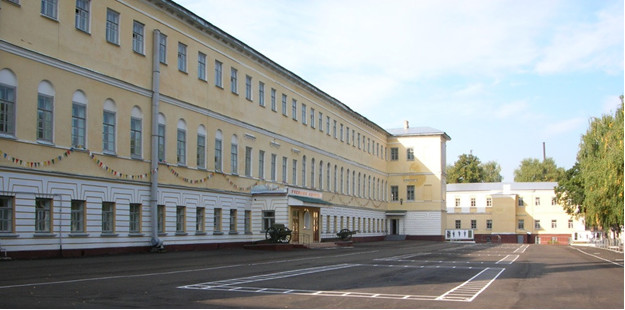
Upon arrival at KzSVU, we were given several days to prepare for the exams. We took exams in mathematics and Russian. They passed both the written and oral exam. There were no problems with this. And they announced to me that I was enrolled in the school. But there was also a fifth exam, or rather, not an exam, but an interview in a foreign language. This was due to the fact that in those days the study of foreign languages was given serious importance in the Suvorov schools. Upon graduation, one could obtain a certificate of a military translator.
The school was taught in two languages: English and French. At school, I studied English, and I had a solid four. Imagine my surprise when at the interview I was told that I had zero knowledge and that I would learn French. There was surprise, but there was no frustration. Learn French - the language of the Great French Revolution, the Paris Commune! "What could be better!" - I thought. And I also remembered how in the fifth grade I really wanted to learn Spanish, the fluent language of Cuba, the language spoken by Fidel Castro and Che Guevara. And here it seemed to me that French is much closer to Spanish than English. We will return to the French language a little later.
I was enrolled in the 3rd platoon of the 7th company (in the photo, the third row from the bottom, the eighth from the right). The company commander was Lieutenant Colonel B.K. Kharchenko. (second row from the bottom, sixth from the right), and the platoon commander was Major A.G. Besedin. (second row from the bottom, fourth from the right):
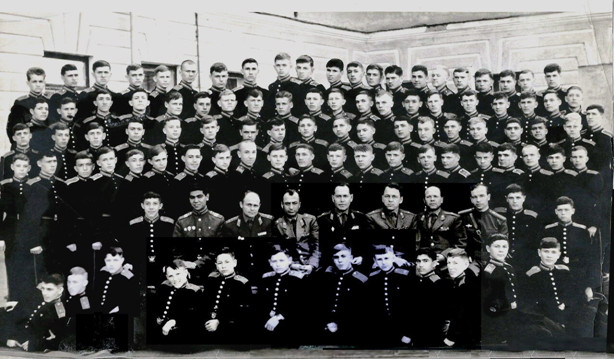
In the photo, our commander is still in the rank of major. He will receive a lieutenant colonel a little later, in October 1968.
The head of the Kazan Suvorov Military School was Major General A.P. Smirnov, a participant in the Great Patriotic War, a participant in the Battle of Stalingrad. I remember his words for the rest of my life, sounding like a parting word:
You sow an act, you reap a habit.How many times in my life have I seen confirmation of these prophetic words.
Sow a habit, you reap a character.
Sow character - reap destiny
When the exams were over, when we received the uniform and certificates of the Suvorovites, there was another interview, this time on a sports topic. They asked me if I was involved in sports and what kind of sports, I said that I was involved in the basketball section and in the sambo section, and also received the III grade in chess. I was told that a basketball player of me with my height is so-so, and there are enough wrestlers in the school. But the fact that I have a chess category is great. I was included in a group of chess players who, after classes, as well as on weekends, went to the House of Officers in the chess section. This, of course, was something, everyone had a three-month quarantine without the right to enter the city (without leave), and you have this right to leave. And sambo skills, of course, came in handy in hand-to-hand combat classes.
But my sports epic had a continuation. It's time to pass the standards for the VSK (military-sports complex). This is an analogue of the TRP (Ready for Labor and Defense) complex.
After the race for a distance of 100 meters, teacher Captain Dergousov Yu.I. and asks where I ran. My answer that this is my first 100-meter race surprised him a lot. At that moment I was 15 years old, I showed the time 12 seconds and we ran at the stadium along the cinder track in ordinary sneakers. From that moment on, I began to train on the sports track. I also had to perform at the central stadium in Kazan. But I especially remember the victory of our team in the May track and field relay, dedicated to Victory Day (I am in the first row, third from the left):
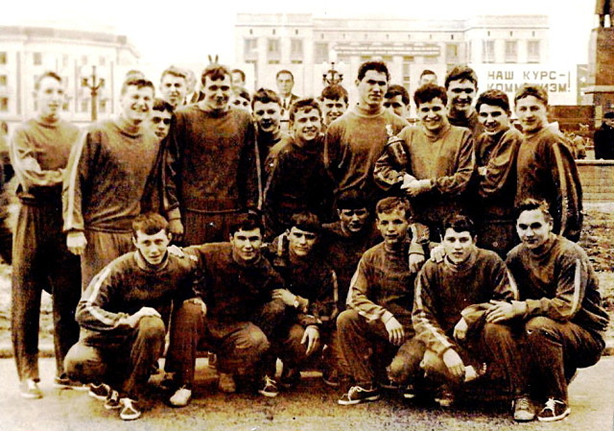
It was a little offensive that we were given the Cup for the first place, and the team members were given sports suits for the second and third places. But look at our faces - we are all happy.
If we talk about physical fitness, then we must still say about skiing. When winter came, we started skiing 5 and 10 kilometers and running until you completed the norm of the II category. In our platoon was Seryozha Lazarev (in the photo he is in the foreground, and I am on the right), originally from Sochi:

At the same time, he had some success in athletics. For example, he took 175 centimeters in height. But skis were not given to him, before school he never got on skis. He was a stubborn guy (in the good sense of the word) and walked and went skiing from morning till night, and we helped him. And he fulfilled the standard. After college, he gave up a military career and eventually became a parapsychologist., little inferior to Chumak and Kashperovsky. Having written about Sergei, I remembered an incident that happened to me at the school. Once I was walking in our park and suddenly, as if in reality, I see my brother Sergei's appendicitis bursting. I stopped rooted to the spot. What to do, how to report home? There were no cell phones then. But cell phones, ordinary telephones were still a rarity! In the end, I decided that this was just a whim, and three days later (that was how many letters went from home to school) I received a letter from my parents, in which they reported that Sergei had purulent appendicitis cut out, it was good that the ambulance arrived quickly and managed to take him to the hospital. Maybe I also had to go into psychics?
I must say that all the officers of the school had excellent physical training. Here are some examples. The head of the school, Major General Smirnov, went with us to the camps in the winter, dug trenches with us in the snow-covered field and rushed with us into the attack after the tank. At the same time, he often said that it was his excellent physical training that saved him from death at Stalingrad. He told this, pointing with his hand to his left chest, where he had a scar: when his heart sank, a bullet entered the chest, which flew past the heart. After the bullet flew, his heart unclenched and he continued the fight.
Or our company lieutenant colonel Boris Kuzmich Kharchenko. Somehow one of us did something and an alarm was announced for educational purposes (it was in summer camps and in a 30-degree heat). The company was built in full gear (overcoat roll-up, machine gun, gas mask). After that, the command was sounded to put on gas masks and a march began for 3 kilometers. Our company commander ran with us and at the same time made sure that no one took off the gas mask. We can say that this is tough, but we did not think so. And what a satisfaction it was when we did it and were dismissed. You can tell a lot, or even better write a separate book.
Now let's get back to the French language. The training was conducted in well-equipped language laboratories in groups. Each group consisted of no more than 12 people. I remember the first lesson well. Our first lesson began with the fact that the teacher Miloradovskaya E.A. suggested to put on headphones and listen to the text from the record. I also listened attentively, but, as it seemed to me, I could understand only two words: Ilya and Baku. And when the teacher asked me what the disc was about, I replied that it was about some Ilya who came or lived in Baku. I was disappointed. It is not Baku that renders this to Baku, but beaucou in the sense of "a lot", and Ilya is also not Ilya, but the sentence "il a" in the sense of "he has." This is how my French learning began. They taught us beautifully. In general, we strove to learn, there was some kind of good competition.I had a sparring partner (so to speak) Seryozha Ogloblin, with whom we competed, who more of us will receive excellent marks for the day, week, etc .:
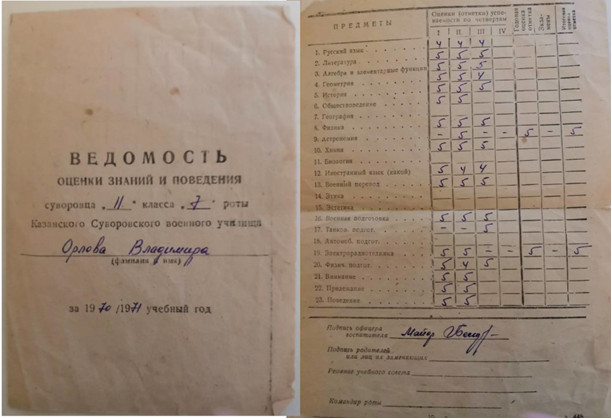
Sergei graduated from college with a gold medal. And the Russian language let me down, despite all the efforts of our beloved teacher Smirnova Nona Vladimirovna. Every day they were asked to memorize several pages of text. We ourselves strove to expand our vocabulary. A number of subjects (for example, astronomy, geography) were given to us not in Russian, but in the language that you study. Naturally, there was foreign literature and military translation. As a result, I graduated from the school with a military translator's certificate:

In addition to the translator's certificate, I received a driver's license and even a hunting license. After graduating from KzSVU, I was ready for adulthood, I could work as a projectionist, driver and even translator.
There were other comic, tragic and tragicomic cases as well. Here I found one of my notebooks (diary), there are many interesting things there.
My first vacation home in December 1968 could have ended in tragedy. Together with me, another young man, Sasha Klenin, the son of one of the officers of the Cheboksary military registration and enlistment office, entered the KzSVU . By the way, later he was a participant in that victorious relay (in the photo, second from the right in the first row).
 So, for the winter holidays, Sasha Klenin's father sent a GAZ-69 (gas / goat) car for him, in which his mother and my father arrived. It was unexpected and pleasant.
So, for the winter holidays, Sasha Klenin's father sent a GAZ-69 (gas / goat) car for him, in which his mother and my father arrived. It was unexpected and pleasant.
And so the five of us drove away from the school in the direction of Cheboksary, and just before leaving Kazan we decided to dine at a roadside cafe (glass, as they were called then). After lunch, having settled comfortably in the car, we set off in the direction of Cheboksary. But we did not go even a hundred meters, when suddenly, tumbling, we flew into a ditch. What happened? It was a bright, sunny and frosty day. The snow has just passed. And after the snowfall, graders went, who cleared not only the road, but also leveled the ditch with the road. And the cliff was decent. And the driver, not suspecting this trick, slightly pressed against the right edge of the road and we flew down. The first thing I remembered was my father's cry (the car was lying on the roof): - Volodya, are you alive? When I answered, he managed to get out of the car and, together with the driver, helped us out of the back seat. The sight was sadthe car is lying on the roof, there is no windshield, and all our faces are covered with shards of glass. But no one broke anything, no one cut himself and no one of us received any injuries other than bruises. Above, on the road, several cars had already stopped, and among them was a crane. When the people standing above realized that everything was fine with us, they began to think how to get us out. The solution was simple, the crane lowered the boom, the driver hooked up the car and pulled it out. We got out on our own along the snowy slope. It turned out that the car was on the move, started up half a turn. There was a dilemma, to go further to Cheboksary, but there is no windshield, it is 20-degree frost on the street and it will soon start to get dark. Or somewhere to look for an opportunity to get and insert glass. How long it will take is unknown. Don't forget - it's 1968, we decided to go to Cheboksary.And since there was no glass, we drove slowly. Sasha Klenin's legs began to freeze. I remember how his mother warmed them all the way on her chest. But at the very least, we got to Cheboksary. My father and I went up to the fourth floor and rang the doorbell. Mom opened the door and immediately sat down, seeing us, and only said: - What's the matter with you? Our faces were blue, a continuous bruise. But the table was set, the broth for the dumplings was boiling. Life went on.Life went on.Life went on.
In the Suvorov School, we were naturally forbidden to drink alcohol and smoke. Moreover, our platoon major Besedin A.G. spoke like this: - It is better to drink a hundred grams of vodka than to smoke a cigarette. I myself started smoking only at the age of 20. But there were those who liked to indulge in a cigarette in our platoon. And then one morning after breakfast, but before classes, two of my comrades, Andrey Nikolaev and Igor Shishov, give me the key to the toilet, which was being renovated, and ask them to close it there for ten minutes, which I did (third from the left, I, fourth Igor Shishov and fifth Andrey Nikolaev):

But the unexpected happened - I forgot about them. It is also surprising that during the whole day, while they were sitting in the toilet, no one remembered about them. After all, when classes began, the duty officer always reported to the teacher about the presence of personnel. And I remembered about them when the company was being built for the evening verification. When leaving, it was a pity to look at them. This is me about the dangers of smoking.
There was also an unpleasant incident related to vodka. Once a bottle of vodka was found in the disposition of our company and no one wanted to confess whose bottle it was. And since only I could go to the city on weekdays (remember chess, the House of Officers), willy-nilly a shadow of suspicion fell on me. But a few days later, the fathers-commanders still figured out who and what. This person turned out to be a Suvorovite, who also had problems with academic performance. As a result, he was expelled from the school. I will not give his last name, but he is in the previous photo and this is not me.
It was forbidden to drink and smoke, but not to marry (upon reaching the age of 18). And we had a tragic incident. One of the Suvorovites met a girl and she became pregnant. The Suvorovite turned out to be the wrong one and refused to marry her. The girl threw herself under the tram. Fortunately (although what happiness can we talk about) she remained alive, but without a foot. Suvorovets was expelled, sent to serve in the army. This is about the fact that you have to answer for your actions.
I will tell you one more instructive case (and there were many such cases). In the summer we went to camps and lived in tents:

There, in the camps, we also had topographic training. At one of the lessons, the platoon commander, Major Besedin, handed us topographic maps, warning that they were secret, and set everyone a task: which route to go, what to find, etc. Before entering the route, we handed over all the maps to the commander. But it turned out not all. When I returned from the route, I saw my pale commander, who first asked if I had taken the map with me. Then I found out that one card is missing. Anyone who has dealt with secret office work understands what is at stake. But in the end the map was found, one of us, the "smartest" one, took the map with him on the route in the hope that it would help him to pass the route better. It turned out that it did not help, he was one of the last to come, but the commander's nerves frayed. Since then, I have known the value of secret record keeping.There were unpleasant incidents when handling weapons. For example, once our first shooter, candidate master of sports, fired a burst from a machine gun in front of the toe of the company commander, Lieutenant Colonel B.K. Kharchenko, when he walked along the breastwork of the trench, in which we were at the ready with machine guns, checking our readiness to shoot at targets.
The pleasant moments of being in summer camps were preparing birch brooms for the fathers of commanders and catching carp with three-liter cans. Not without volunteers to go to the nearest village of Derbyshki for dancing.
The Suvorov School was only a step into adulthood. I had to think, what do I want to become? In 1968, the film "Dead Season" was released, and the newspaper "Komsomolskaya Pravda" published a series of articles about Soviet intelligence officers, if my memory serves me right, about Abel and Kim Philby. In 1969, bloody events took place around Damansky Island in the Far East. How we all were eager to go there, to Damansky. I decided for myself that I should become a scout. Everything went to the fact that it will be so. The company commander and the platoon leader knew about my cherished desire. When I started studying in the 11th grade, I was suddenly called for an interview. As I later found out, the order came to the Volga Military District for two places in the higher school of the KGB. There were 600 (six hundred) candidates examined and the choice fell on me and another Suvorov member, whose father served in the Committee. I was happy.But when the Suvorov military school learned that I had agreed to go to the higher school of the KGB, something incomprehensible to me began, the teachers began to dissuade me. Some said that one should go to the academy of communications, some to the academy of chemical protection, some to Mozhaika, etc. And everyone said that I was burying my talent, some in mathematics, some in physics, some in chemistry, etc. But I stood my ground and passed various commissions. Once my father came to me and, as usual, stayed with Andrei Nikolaev's parents. His parents taught at the veterinary institute, his father was a professor, his mother was an associate professor (at least, this is what I remembered) (from left to right - my mother, Andrei Nikolaev's mother, Andrei, my father, my brother Sergei below) and were friends with my parents:teachers began to discourage. Some said that one should go to the academy of communications, some to the academy of chemical protection, some to Mozhaika, etc. And everyone said that I was burying my talent, some in mathematics, some in physics, some in chemistry, etc. But I stood my ground and passed various commissions. Once my father came to me and, as usual, stayed with Andrei Nikolaev's parents. His parents taught at the veterinary institute, his father was a professor, his mother was an associate professor (at least, this is what I remember) (from left to right - my mother, Andrei Nikolaev's mother, Andrei, my father, my brother Sergei below) and were friends with my parents:teachers began to discourage. Some said that one should go to the academy of communications, some to the academy of chemical protection, some to Mozhaika, etc. And everyone said that I was burying my talent, some in mathematics, some in physics, some in chemistry, etc. But I stood my ground and passed various commissions. Once my father came to me and, as usual, stayed with Andrei Nikolaev's parents. His parents taught at the veterinary institute, his father was a professor, his mother was an associate professor (at least, this is what I remembered) (from left to right - my mother, Andrei Nikolaev's mother, Andrei, my father, my brother Sergei below) and were friends with my parents:But I stood my ground and passed various commissions. Once my father came to me and, as usual, stayed with Andrei Nikolaev's parents. His parents taught at the veterinary institute, his father was a professor, his mother was an associate professor (at least, this is what I remember) (from left to right - my mother, Andrei Nikolaev's mother, Andrei, my father, my brother Sergei below) and were friends with my parents:But I stood my ground and passed various commissions. Once my father came to me and, as usual, stayed with Andrei Nikolaev's parents. His parents taught at the veterinary institute, his father was a professor, his mother was an associate professor (at least, this is what I remember) (from left to right - my mother, Andrei Nikolaev's mother, Andrei, my father, my brother Sergei below) and were friends with my parents:

And so, when I came to visit them and we all sat down at the dinner table, the conversation arose again about where I should study further. Nikolai Sergeevich, Andrei's father, said: “Imagine, Volodya, time will pass and you will find yourself at the table as well, but as soon as you sit down at the table, everyone will be silent and you will feel very uncomfortable. And now you don't get excited, but think carefully. " When my father and I were left alone, he said to me: "Volodya, maybe they are right, they are literate people, unlike my mother and I, maybe it's really not worth going there." This was the last straw. I said that it was good, I would refuse the offer to study at the HSE, but I didn’t know where I would go yet. Then I had a difficult conversation, difficult for me, that I did not justify the trust placed in me, with the director who oversaw the selection of candidates for the HSE. I think,he understood me and when he asked who, if not me, then I, without hesitation, named Seryozha Ogloblin. And so it happened, Sergei went instead of me. Later in Moscow we met with him, and then we got lost.
I had to decide where to go. There was an idea to go to the Medical Academy. SM Kirov, then in the newspaper "Krasnaya Zvezda" I came across an announcement about the recruitment of students to the Military Academy. F.E. Dzerzhinsky. I urgently wrote a letter there with a request to send the conditions of admission. And I received a parcel post with a booklet and a program of entrance exams. I must say that at the school no one knew anything about this academy. But for me everything was decided. This is study in Moscow, there is a faculty of communications and radio electronics, and the most important thing is the name “im. FE Dzerzhinsky ", somewhere close to my dream of the exploits of a scout. Yes, there was not a word about training programmers. Yes, I also did not know a word like that. They began to dissuade me again, but I no longer paid attention. Our platoon commander Major A.G. Besedin made an attempt to dissuade me. He said the following:“Volodya, my friend served on the island of Franz Josef Land, where food is delivered once every six months. And then the moment came when he managed to escape from there and enter the Dzerzhinsky Academy. Imagine his disappointment when, after graduating from the academy, he was again sent to this island. I didn’t know that the academy. F.E.Dzerzhinsky trained missilemen. But now nothing could force me to change my mind. Just before graduation from the school, our teacher of mathematics, Egorova L.F. said that immediately after graduation we begin to prepare for the exams. But I replied that right after graduation I was going to my parents, and from there to the academy. I'm ready for admission. It seemed to me that she was offended by my refusal. But in the end I was right.where food is delivered every six months. And then the moment came when he managed to escape from there and enter the Dzerzhinsky Academy. Imagine his disappointment when, after graduating from the academy, he was again sent to this island. I didn’t know that the academy. F.E.Dzerzhinsky trained missilemen. But now nothing could force me to change my mind. Just before graduation from the school, our teacher of mathematics, Egorova L.F. said that immediately after graduation we begin to prepare for the exams. But I replied that right after graduation I was going to my parents, and from there to the academy. I'm ready for admission. It seemed to me that she was offended by my refusal. But in the end I was right.where food is delivered every six months. And then the moment came when he managed to escape from there and enter the Dzerzhinsky Academy. Imagine his disappointment when, after graduating from the academy, he was again sent to this island. I didn’t know that the academy. F.E. Dzerzhinsky trained missilemen. But now nothing could force me to change my mind. Just before graduation from the school, our teacher of mathematics, Egorova L.F. said that immediately after graduation we begin to prepare for the exams. But I replied that right after graduation I was going to my parents, and from there to the academy. I'm ready for admission. It seemed to me that she was offended by my refusal. But in the end I was right.when, after graduating from the academy, he was again sent to this island. " I didn’t know that the academy. F.E.Dzerzhinsky trained missilemen. But now nothing could force me to change my mind. Just before graduation from the school, our teacher of mathematics, Egorova L.F. said that immediately after graduation we begin to prepare for the exams. But I replied that right after graduation I was going to my parents, and from there to the academy. I'm ready for admission. It seemed to me that she was offended by my refusal. But in the end I was right.when, after graduating from the academy, he was again sent to this island. " I didn’t know that the academy. F.E.Dzerzhinsky trained missilemen. But now nothing could force me to change my mind. Just before graduation from the school, our teacher of mathematics, Egorova L.F. said that immediately after graduation we begin to prepare for the exams. But I replied that right after graduation I was going to my parents, and from there to the academy. I'm ready for admission. It seemed to me that she was offended by my refusal. But in the end I was right.that immediately after graduation I go to my parents, and from there to the academy. I'm ready for admission. It seemed to me that she was offended by my refusal. But in the end I was right.that immediately after graduation I go to my parents, and from there to the academy. I'm ready for admission. It seemed to me that she was offended by my refusal. But in the end I was right.
On one of the last days of my stay at the school, a Suvorov soldier from the neighboring sixth company, a gold medalist Zhenya Arsentiev, suddenly came up to me. He asked: "Is it true that you are going to the Dzerzhinsky Academy?" Having received a positive answer, he offered to go to the academy together. It turned out that his older brother teaches chemistry at the academy, has the military rank of colonel and a doctorate degree. We agreed to meet at the academy, God forbid, on June 30, 1971. I still did not know that in September 1971 the training of military software engineers began at the academy.
Now I understand that I had three reference points that led me to the path of programming: entering KzSVU, refusal to study at the high school of the KGB and a meeting with Zhenya Arsentiev. But the most important thing is the deep knowledge that I received at the Kazan Suvorov military school. Many thanks to our teachers:

Before graduating from the KzSVU, we were dressed in a brand new parade cadet uniform, were given travel passes, prescriptions, and we departed into adulthood.
III. Admission to the Military Academy. F.E. Dzerzhinsky
On the way to VAD, for several days, for the first time in a cadet's uniform, I dropped into my parents' house:

But the vacation in the summer of 1971 was purely symbolic. And after a few days I was escorted to the airport for a plane to Moscow. My father insisted, as always (for which I am deeply grateful to him), on the general photo:

And now in Moscow I am standing at the checkpoint (checkpoint) of the Academy. F.E. Dzerzhinsky, I'm waiting for Zhenya Arsentiev:
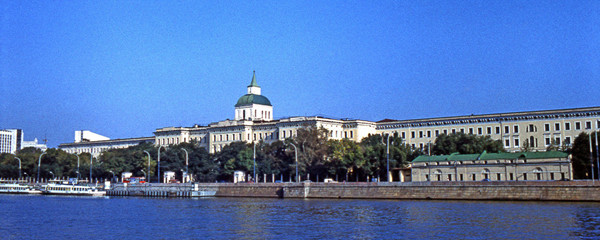
In this photo, the Rossiya Hotel is still visible on the left. Zhenya came up and said that his brother offered to live at his house for a couple of days, while everything at the academy settles down with the admission of applicants. I was in Moscow in my earliest childhood, back in 1957-58. So for me it was all over again. As it turned out, there is a lot for Eugene. It all started with him with a comic incident. When we arrived at the house of Zhenya's brother, we had to take the elevator (before that I took the elevator once or twice, and then one or two floors). Here it was necessary to climb higher. When we entered the elevator, the floor, naturally, but not for us, dropped. We pressed the required floor and drove off, but then one of us suggested - let's jump! And we did it. As a result, the elevator stopped. There is no one around. We do not know what to do. Fortunately for us, thirty minutes later, an old woman passed by, seeing us, she began to cry,broke again. I'm going to call the lifter now. The elevator operator came, opened the door and we crawled out (crawled out) from the elevator. Nobody thought that it was we who broke the elevator due to our provincial illiteracy. In the evening, Colonel Arsentiev returned from the academy, we had dinner and he said: -
"A new faculty has been opened at the academy, which will train programming specialists."
He does not really understand what this is, but he feels that there is a great future behind this and his advice to us to keep our way to the second faculty for the specialty "Programming". But if the younger Arsentiev as a gold medalist needed only his desire, then I still had to pass the exams.
Three days later, I come to the academy and start looking for the reception office of the head of the II faculty. Getting lost in the corridors of the academy is not difficult. And then a cadet in everyday uniform comes towards me, his boots shine, the uniform is ironed and, most importantly, with the Suvorov sign. It seemed to me that this cadet had been studying here for more than a year and I turned to him for help, asking where and how to go. Now I immediately remember Frosya Burlakova from the movie "We'll Live Until Monday," and then this student confidently told me everything and showed me everything, and we parted. Imagine my surprise when, at the written exam in mathematics (by tradition, I was going to hand over the work and leave the classroom), someone touched me on the shoulder from behind. I looked around and saw the cadet who explained everything to me so sensibly. He asked me not to hand over the work,do not leave and help solve his problem. I fulfilled his request. Nikolai Gudim (in the photo he is on the left), that was his name, in the end he also entered the academy:
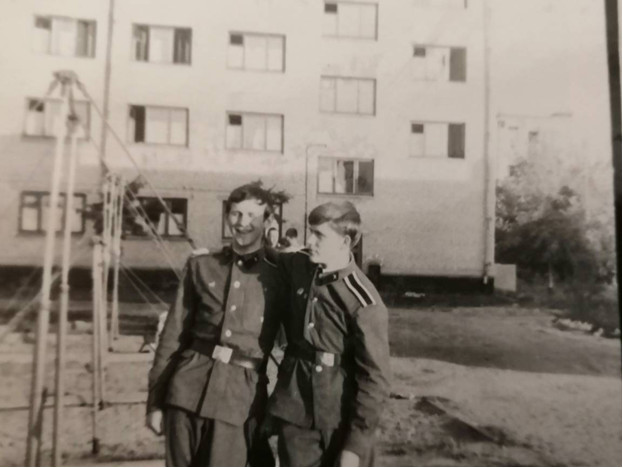
We studied in the same department. He became the foreman of the course (sergeant), and I became the deputy platoon commander (junior sergeant). But more on that in the next part. As a result, I passed all the exams perfectly:

In total, in 1971, two departments of programmers were recruited, which in September 1971 began training in this specialty. And there were also three departments, where they trained engineers for the operation of electronic computing complexes.
In the photo below, my office (I am the third from the left in the second row from the bottom, Kolya Gudim is the second from the right in the second row from the top):

IV. Afterword to the first part
After graduating from the academy, our paths with Kolya Gudim parted ways. But six years later, after I served in the GRU (one way or another, but I followed my dream), in 1982 I defended my dissertation on distributed database management systems in the same Dzerzhinka, we met at the 4th Central Scientific - Research Institute of the Ministry of Defense (4 TsNII MO). But this will be discussed in the next part:
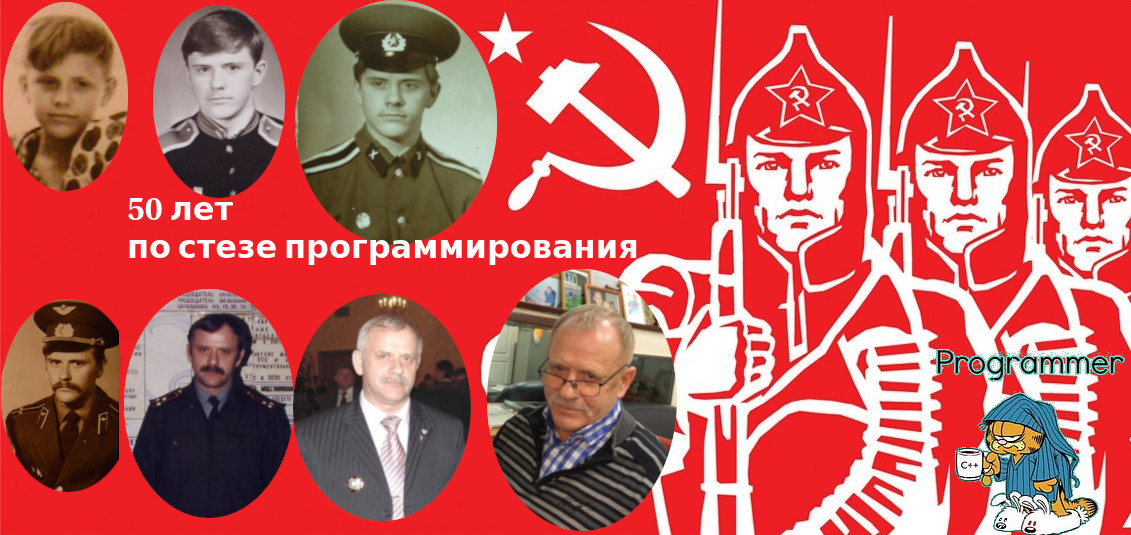
It will tell not only about how I was taught to be a programmer and how I became a programmer, but also how I caught saboteurs, how I defended my Ph.D. thesis, and the chairman of the Academic Council is a doctor of technical sciences, etc. etc. Yuri Vasilyevich Kryuchkov proposed to confer a Doctor of Technical Sciences degree on me, how we planned to create a global network, and what prevented us, how he looked for network technology specialists in the allied academies of sciences, and found in the provincial Russian city of Kirov, and about many other things.